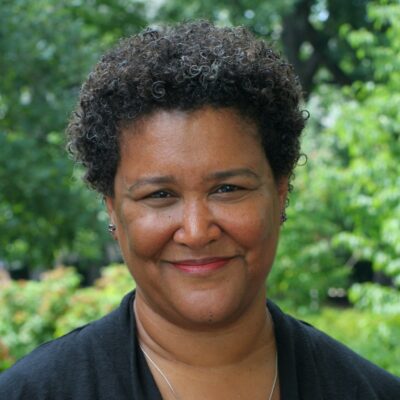Join Hard Histories at Hopkins for a virtual discussion about the transnational dimensions of Hard Histories work. Dr. Leslie M. Harris (Northwestern) is a foremost scholar on the histories of slavery and the university. Dr. Ariela Gross (UCLA Law) has conducted comparative research on the histories of slavery in the US and in other countries. In this webinar, Hard Histories Project Director Dr. Martha S. Jones will be in discussion with Drs. Gross and Harris in-person in Berlin, Germany to discuss the complexities of how questions about history, memory, and reckoning surrounding legacies of racism and discrimination operate across and between national borders.
Speakers:
 Ariela J. Gross is a Distinguished Professor of Law at the University of California Los Angeles. She was previously the John B. and Alice R. Sharp Professor of Law and History and Co-Director of the Center for Law, History, and Culture at the University of Southern California. Her most recent book, co-authored with Alejandro de La Fuente, Becoming Free, Becoming Black: Race, Freedom, and Law in Cuba, Virginia, and Louisiana (Cambridge UP, 2020), was the winner of the 2021 Order of the Coif Award for the best book on law, and the John Philip Reid Award for the best book in Anglo-American legal history from the American Society for Legal History. Her book What Blood Won’t Tell: A History of Race on Trial in America (Harvard UP 2008), was winner of the James Willard Hurst Prize from the Law and Society Association, the Lillian Smith Award for the best book on the U.S. South and the struggle for racial justice, the American Political Science Association’s Best Book on Race, Ethnicity, and Politics, and a Choice Outstanding Academic Title. Gross is also the author of Double Character: Slavery and Mastery in the Antebellum Southern Courtroom (Princeton UP 2000).
Ariela J. Gross is a Distinguished Professor of Law at the University of California Los Angeles. She was previously the John B. and Alice R. Sharp Professor of Law and History and Co-Director of the Center for Law, History, and Culture at the University of Southern California. Her most recent book, co-authored with Alejandro de La Fuente, Becoming Free, Becoming Black: Race, Freedom, and Law in Cuba, Virginia, and Louisiana (Cambridge UP, 2020), was the winner of the 2021 Order of the Coif Award for the best book on law, and the John Philip Reid Award for the best book in Anglo-American legal history from the American Society for Legal History. Her book What Blood Won’t Tell: A History of Race on Trial in America (Harvard UP 2008), was winner of the James Willard Hurst Prize from the Law and Society Association, the Lillian Smith Award for the best book on the U.S. South and the struggle for racial justice, the American Political Science Association’s Best Book on Race, Ethnicity, and Politics, and a Choice Outstanding Academic Title. Gross is also the author of Double Character: Slavery and Mastery in the Antebellum Southern Courtroom (Princeton UP 2000).
Professor Gross has published numerous articles on the law and politics of race and the memory of slavery in the United States and France, and on the grassroots history of colorblind conservatism, and her op-eds have appeared in the Washington Post, LA Times, and the Wall Street Journal. She received her JD (Order of the Coif) and PhD in History from Stanford University, and has been a visiting professor at Stanford Law School, Tel Aviv University, the Ecole des Hautes Etudes en Sciences Sociales, Kyoto University, and the University of Paris 2 and 8. She has been a Guggenheim Fellow, a Harvard-Radcliffe Institute Joy Foundation Fellow, a Stanford Center for Advanced Study in the Behavioral Sciences Fellow, an ACLS Burkhardt Fellow, an ACLS Collaborative Research Fellow, an NEH Huntington Research Libraries Fellow, winner of the Rutter Distinguished Teaching Award and the Mellon Mentoring Award at USC.

Leslie M. Harris is Professor of History and Black Studies at Northwestern University. A specialist in Pre-Civil War African American history, she has authored or co-edited five books, including the award-winning In the Shadow of Slavery: African Americans in New York City (2003; 2nd edition, 2023) and most recently Slavery and the University: Histories and Legacies (2019, with James T. Campbell and Alfred L. Brophy). Harris has also participated in a number of public history projects, including the award-winning Slavery in New York exhibition (2005-2007) at the New-York Historical Society, and the accompanying (co-edited with Ira Berlin); the re-interpretation of the urban slave quarters at Telfair Museum’s Owens-Thomas House in Savannah, Georgia, which included the edited volume Slavery and Freedom in Savannah (2013, with Daina Ramey Berry); and the NEH-funded interactive website “People Not Property” created by Historic Hudson Valley (https://peoplenotproperty.hudsonvalley.org, 2019). Harris is currently completing Leaving New Orleans: A Personal Urban History, a book that combines memoir with family, urban and environmental histories to explore the multiple meanings of New Orleans from its founding through its uncertain future amid climate change.
Harris received her undergraduate degree at Columbia and her doctoral degree at Stanford. Before moving to Northwestern, she taught for 21 years at Emory University. Her work has also been supported by the Newberry Library, the Harvard Radcliffe Institute, the Mellon and Ford Foundations, the Schomburg Center for Research in Black Culture, the Institute for Historical Studies at the University of Texas, and the University of Maryland.

Dr. Martha S. Jones is the Society of Black Alumni Presidential Professor, Professor of History, and a Professor at the SNF Agora Institute at Johns Hopkins University. She is also a legal and cultural historian whose research explores how Black people have shaped the story of American democracy, and today extends to work on memorial landscapes and family memoir. Jones directs the Hard Histories at Hopkins Project which, since 2020, has examined the role of slavery and racism at the Johns Hopkins University and Hospital.
Jones’ most recent book, Vanguard: How Black Women Broke Barriers, Won the Vote, and Insisted on Equality for All (2020), received the 2021 Los Angeles Times Book Prize for History. Her 2018 book, Birthright Citizens: A History of Race and Rights in Antebellum America, was recognized with awards from the American Historical Association, Organization of American Historians, American Society for Legal History, and Baltimore City Historical Society Scholars.
This event is part of a series of conversations hosted by Hard Histories in spring 2024, exploring the histories of Blackness, slavery, and racism in the Maryland area and beyond. Launched in fall 2020, the Hard Histories at Hopkins Project examines the role that racism and discrimination have played at Johns Hopkins. Blending research, teaching, public engagement, and the creative arts, Hard Histories aims to engage our broadest communities—at Johns Hopkins and in Baltimore—in a frank and informed exploration of how racism has been produced and permitted to persist as part of our structure and our practice.
